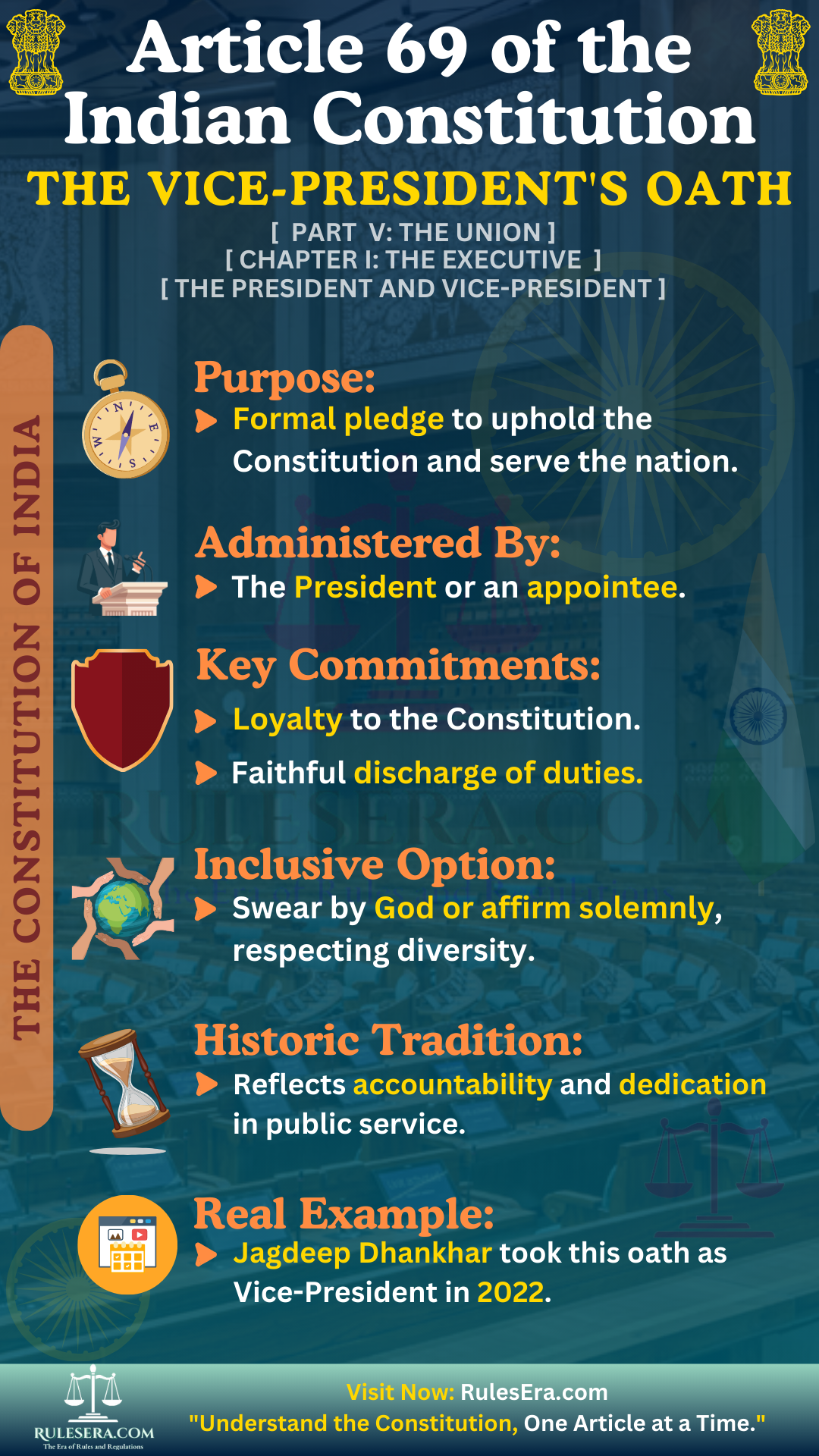Part V: The Union
Chapter I: The Executive
Article 69: Oath or affirmation by the Vice-President

--- Original Article ---
Every Vice-President shall, before entering upon his office, make and subscribe before the President, or some person appointed in that behalf by him, an oath or affirmation in the following form:
"I, A.B., do swear in the name of God/solemnly affirm that I will bear true faith and allegiance to the Constitution of India as by law established and that I will faithfully discharge the duty upon which I am about to enter."
Explanation:
Article 69 establishes the procedural and constitutional obligation for every Vice-President of India to swear an oath or affirmation before entering office. This article is critical in ensuring the Vice-President’s commitment to uphold the constitutional principles and undertake their duties with a sense of responsibility toward the nation.
Key Provisions:
- Oath or Affirmation Requirement:
The Vice-President must take an oath or make an affirmation to pledge loyalty to the Constitution. This requirement is foundational in asserting the Vice-President's dedication to the democratic and constitutional framework of the country.
- Who Administers the Oath:
The oath is administered by the President or another official designated by the President. This protocol highlights the formal and dignified nature of the event, as it is conducted by the head of state or their appointee.
- Form of the Oath or Affirmation:
The specific wording of the oath emphasizes two commitments:
- Loyalty to the Constitution of India and adherence to its legal framework.
- Faithful execution of the responsibilities of the Vice-President's office.
Amendments:
Article 69 remains in its original form and has not been amended since its inception. It remains a fundamental part of the constitutional process of office assumption for high-ranking officials.
Real-Life Examples:
In 2022, when Jagdeep Dhankhar assumed the office of Vice-President, he made an affirmation in the presence of the President of India, pledging to uphold the Constitution. This oath-taking marked his official commencement as the Vice-President, signifying his formal entry into a role crucial for the country’s legislative functioning.
Historical Significance:
The oath-taking ceremony of the Vice-President is modeled after similar practices in other parliamentary democracies, ensuring that public officials publicly affirm their allegiance to the law and the Constitution. This tradition, inherited from the British parliamentary system, reinforces the gravity of public service and accountability.
Article 69 was crafted during the Constitution’s formulation to reflect the new democratic ethos of independent India. The founders of the Constitution, aware of the significance of symbolic actions, established this requirement to embody the values of fidelity to the rule of law and duty.
References:
- Constituent Assembly Debates
- Ceremonies of Vice-Presidents of India at Rashtrapati Bhavan
- The Constitution of India (1950)
- Inauguration ceremonies of Vice Presidents from historical records and national archives
Debates and Deliberations:
During the debates on Article 69, members of the Constituent Assembly emphasized the importance of a formal oath for the Vice-President. Prof. K. T. Shah advocated for the oath to include specific references to the Vice-President’s role in ensuring the functioning of the Council of States, reinforcing their role in legislative affairs.
Shri R. K. Sidhwa supported this view, suggesting that the Vice-President's commitment to the democratic process should be explicitly mentioned in the oath. He argued that the oath-taking is not just a formality but a solemn affirmation of one’s allegiance to the Constitution and the duties therein.
Dr. B. R. Ambedkar countered that the simplicity of the oath should be maintained, ensuring that the core focus remains on fidelity to the Constitution and the faithful discharge of duties. He believed that introducing additional elements might dilute the gravity of the oath and extend it beyond its intended purpose.
Frequently Asked Questions (FAQs):
The oath signifies the Vice-President's allegiance to the Constitution of India and their commitment to faithfully discharge their duties in office.
The oath is administered by the President of India, or another official appointed by the President for this purpose.
No, the oath remains in its original form as stated in Article 69 of the Indian Constitution, emphasizing loyalty to the Constitution and the faithful discharge of duties.